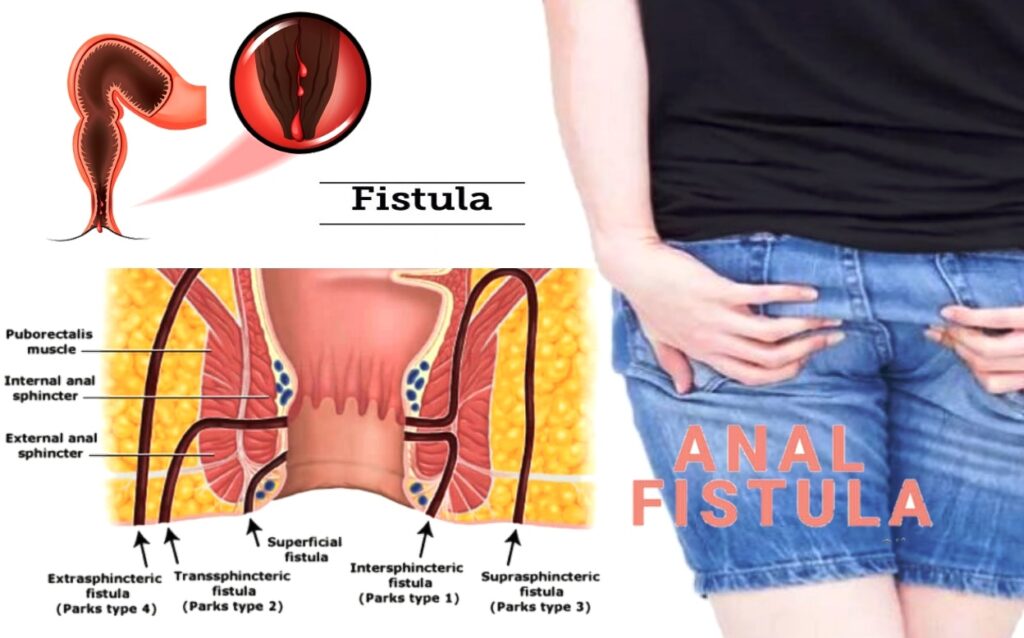- Phone: +919646764444
- Mon-Sat (9am - 2pm & 4pm - 7pm)
- arogyampilesclinic@gmail.com

An anal fistula, also known as a fistula-in-ano, is a tunnel that forms between the anus’s interior and the skin that surrounds it. The muscular opening at the end of the digestive tract where stools leave the body is called the anus.
Most butt-centric fistulas are the consequence of a disease that beginnings in a butt-centric organ. An abscess develops as a result of the infection, which can either drain on its own or undergo surgical drainage through the skin adjacent to the anus. The infected anal gland or anal canal is connected to a hole in the outer skin around the anus by a drainage tunnel that remains open.
Fistula in ano is a condition characterized by an abnormal connection between the epithelialized surface of the anal canal and the perianal skin. It is also known as perianal fistula, anal fistula. In Hindi it is known as Bhagandra.
Symptoms often include discomfort, pain especially during bowel movements, bleeding, and the discharge of pus or blood, resulting in irritation of the skin around the anus. Some patients may also experience systemic signs of infection such as fever. The persistence and recurrence of these symptoms are common, leading to significant distress and impact on the quality of life.
The primary cause of fistula in ano is an anal abscess, an infected cavity filled with pus found near the anus or rectum. Approximately 50% of these abscesses may progress to form fistulas. Other causes include specific conditions like Crohn’s disease, previous surgery near the anus, and trauma. Moreover, infections, including tuberculosis and HIV, have been recognized as contributing factors. The pathophysiology of fistula in ano involves infection that breaches the mucosal layer of the anal canal, creating a tract.
Fistulae in ano are classified based on their relationship to the anal sphincters: intersphincteric, transsphincteric, suprasphincteric, and extrasphincteric. Intersphincteric fistulas, located between the internal and external sphincter muscles, are the most common type. Transsphincteric fistulas pass through the external and internal sphincter, whereas suprasphincteric fistulas cross above the sphincter complex. Extrasphincteric fistulas connect the rectum to the skin, bypassing the sphincter complex, and are often the result of disease or injury.
Diagnostic methods for identifying fistula in ano include a thorough physical examination, imaging studies like MRI or ultrasound, and an anoscopy. Fistulography, although less commonly used now, involves injecting a contrast dye to outline the fistula tract. A newer technique, MRI fistulography, offers superior visualization of complex fistulas. Additionally, examination under anesthesia (EUA) allows for accurate mapping and assessment of the fistula tract, which is critical for planning treatment.
Treatment aims at eradicating the fistula tract, controlling infection, and preserving anal sphincter function to prevent incontinence. Surgical options include fistulotomy, where the fistula tract is opened and allowed to heal from the base upwards, and the placement of setons threads that help drain the infection and cut through the sphincter muscle slowly to minimize damage. Advanced procedures like the LIFT (ligation of intersphincteric fistula tract) technique, and the use of fibrin glue or bioprosthetic plugs are also employed to treat complex fistulas.
Preventing the formation of anal abscesses is crucial to reduce the risk of developing fistulas. Practices include maintaining good hygiene, managing diarrhea and constipation to prevent strain during bowel movements, and treating gastrointestinal infections or inflammations timely. Regular medical check-ups can help in the early detection and treatment of potential issues.
The Ayurvedic treatment for fistula in ano, known as Kshar Sutra, involves the use of a medicated thread that is passed through the fistula tract. This ancient technique facilitates healing by cutting through the fistula and chemically cauterizing it, leading to fibrosis and closing of the tract. Kshar Sutra is appreciated for its minimal invasiveness, lower recurrence rates, and preservation of sphincter muscle function compared to conventional surgery. Studies have shown it to be an effective treatment option, offering a promising alternative for patients seeking non-conventional management strategies.
If your are looking for Kshar Sutra for Fistula in Ano then your can fix your appointment with our experienced doctors at Arogyam Piles Clinic and Research Center located in Mohali, Chandigarh. We offer traditional kshar sutra treatment along with advance kshar sutra treatment ( IFTAK Technique). Our center is the only center in the region to offer advance kshar sutra treatment in anal fistula. To book an appointment you can visit our official website www.arogyampilesclinic.com or directly call +91 96467 64444.
For more information or book your appointment
Call now 9646764444
Whatsapp 9646764444
***We Promise, no spam!
The desire to live a long and healthy life and to attain the fulfilment of pleasure, wealth and fame is only possible by following ayurveda in life.
© 2024, All Rights Reserved.